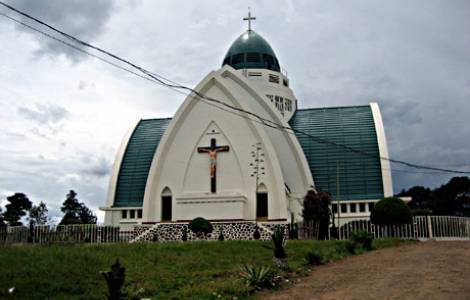
Kinshasa (Agenzia Fides) - "We are grateful to be alive", this is the prevailing mood in Bukavu, the capital of the Congolese province of South Kivu, in the east of the Democratic Republic of Congo, which was taken by the M23 on February 16 (see Fides, 17/2/2025).
In a statement sent to Fides, a source of the local Church describes the situation in the city a week after its capture.
"Yesterday, Sunday 23 February, the first morning Mass in the parish of Nguba, on the outskirts of Bukavu, was almost as crowded as usual with people. Some were still afraid to go out on the street before six o'clock, the first light of dawn, and postponed going to the second Mass. There is a choir worthy of the Vatican celebrations and there is a great desire to say thank you. Father Jean-Marie, the celebrant, expressed everyone's thoughts: 'I wasn't sure if we would still be here this Sunday to praise the Lord. Let us give thanks!" "How could I not dance and give thanks?' repeats an elderly woman. The feeling of gratitude after having escaped danger is palpable in the assembly. The new conquerors had only entered the city last Sunday, after days of unrest. And while they were supposedly maintaining order, they had increased the number of fatalities: between Friday 14 February and Monday 17 February, the Red Cross counted twenty-six dead. When I hear the songs, the clapping and the dancing, I think that this is the resilience of this people: their stubborn faith in God, their ability to thank him for the positive without blaming him for the negative: they know that it is a matter of human responsibility," reports the local source.
The city is without leadership: "The previous rulers have fled, the new ones have not yet been appointed; the streets are without police: 2,200 of them have been sent to Goma for training and will receive the uniforms of the new rulers. There is no longer any talk of the soldiers of the Congolese army: they have fled to create unrest in the Ruzizi plain further south and in Uvira. There is strong local resistance there from the Wazalendo militia and it will not be easy to occupy the places. For now, despite various rumors, it looks as if the M23 are only in Kamanyola, or perhaps not even there. In the meantime, a large part of the plain's population has fled to Burundi in recent days, many across the wide Ruzizi river: and who counts the children swept away by the floods?".
The call to everyone in Bukavu is to go back to work: "Tomorrow (today, February 24, editor's note) classes are due to resume in schools, at least primary schools, but who will pay the salaries of teachers in public and state-supported schools if they say Kinshasa no longer has anything to do with these provinces?".
In Kinshasa, strange incidents are occurring: "They arrest young people just because they speak Swahili, the language of the East, and accuse them of being accomplices of the Rwandans. It is urgent that an authority speaks out to restore freedom and security and give the population guidance."
"The M23 rebel movement, a cover for the Rwandan occupation, numbers only about ten thousand men (the Burundian soldiers sent to support the Congolese army alone numbered fifteen thousand!)," the source continued. "How can the movement think of occupying an entire country or even just the eastern provinces? As for the rebellion led by Corneille Nangaa (head of the Congo River Alliance, ed.), it was launched at the last minute and would be insignificant without the support of the M23. For this reason, the M23 is in a hurry to recruit new fighters."
"According to various witnesses, the M23 in Goma surrounds every neighborhood where it suspects resistance and goes from house to house, from school to school. If someone gives the impression of being a wazalendo or a resistance fighter of the Congolese army, they take them to join their group. If they resist, they shoot," the source reports.
"But none of this seems to move the minds of the people gathered to praise their Lord," the source concludes. "They are sure that beyond human plans, there is God and that everything is in his hands. Next to the altar, in the preparation of the offerings, there are still piles of sacks of flour and rice: a donation for the poor of the community that the base communities take turns to deliver every Sunday". (L.M.) (Agenzia Fides, 24/2/2025)